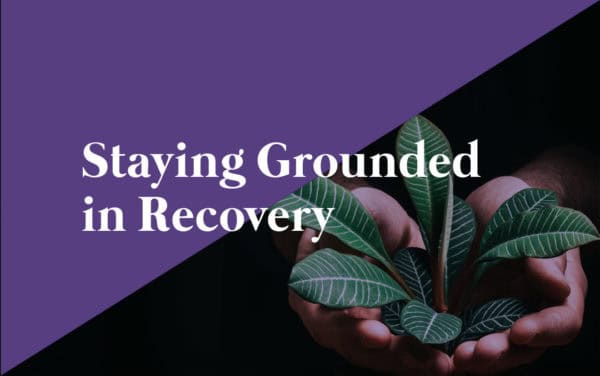
by Kerri MacFarlane | Oct 15, 2021 | Blog, Early Sobriety, Helpful Tips, The first Year, Uncategorized
What do you do when you get a craving? When you’re in that moment and your next move may decide whether you pick up a bottle, or not. And how do you feel when you’re in that moment?
For example…I feel anxious, I feel panicky and I feel nervous.
In a recent therapy session I shared with my therapist that since my recent relapse I have been noticing I am having more frequent moments of feeling anxious and feeling cravings come up. I don’t know if these feelings are really more frequent or if I am just paying closer attention now…but regardless, the feelings are there either way. (Side note – Back to 72 days alcohol free as of this writing!),
She asked me what I do when these feelings come up? Did I know what grounding was, did I use any grounding techniques or grounding exercises when I was “in” those moments?
I know what being grounded is…I was grounded a lot while growing up. ? And I’ve heard the term grounding used with earthing…walking around outside barefoot, which I also do a lot of. But she was talking about something else.
She gave me some grounding techniques that I had never heard of…that I could do anywhere, at any time. I’ve used these…and I have found them helpful. They help me turn my attention away from my anxious mind and off the craving…help me refocus on the present moment. And help me move into the next hour sober. I’m going to share some of them with you and maybe you will find them helpful as well. ??
The 5-4-3-2-1 Grounding Technique (or the 5 Senses Technique)
Our physical body is how we interface with the rest of reality, the five senses like tethers anchoring us to the moment.
- Look For 5 Things You Can See: Look for the small details, the wood grain on the desk in front of you, the pattern in the ceiling. Become aware of the glossy green of the plant in the corner. Take your time to really look and acknowledge what you see. Maybe look for something that you may not have noticed before.
- Become Aware Of 4 Things You Can Touch/Feel: The clothing on your body, your cotton shirt against your neck. The warmth of the sun on your skin. The wind blowing through your hair. The chair you are sitting on. It may help to vocalize these…”I feel the wind blowing through my hair, I feel the warmth of the sun on my face.”
- Acknowledge 3 Things You Can Hear: Pay special attention to the sounds your mind has tuned out. Don’t judge, just hear. The distant traffic. The ticking of the clock. The roosters outside. (I’m in Hawaii as I write this, there are a lot of roosters outside. ?) The voices in the next room.
- Notice 2 Things You Can Smell: Try to notice smells in the air around you, like an air freshener or freshly mowed grass. If at first you don’t feel like you can smell anything, simply try to sense the subtle fragrance of the air around you, or of your own skin.
- Become Aware Of 1 Thing You Can Taste: I suggest carrying snacks for this step…because, snacks…duh. Pop one in your mouth and focus your attention closely on the flavors.
Repeat, repeat…as many times as needed. ??
Another grounding technique she shared with me was like playing a game of “categories” with yourself.
Pick a category (types of dogs, fruits and veggies, cereals, jazz musicians, animals, famous people, cars, TV shows, writers, sports, songs, cities, etc.) and name as many items in the category that you can think of. For a variation name the items alphabetically or try to name an item in the category that begins with each letter of the alphabet. This can also be a great game to keep kids preoccupied in the car!
For some more grounding techniques Paul shared some of his here.
Like I said in the beginning…I had a recent relapse. Weirdly I feel alright about that. I have found these quick and easy grounding techniques to be very helpful for me at this stage of my journey. I hope that they may help you too.
If you have any that you use and would share, please drop them in the comments!
Until next time, be well.
Kerri Mac ?
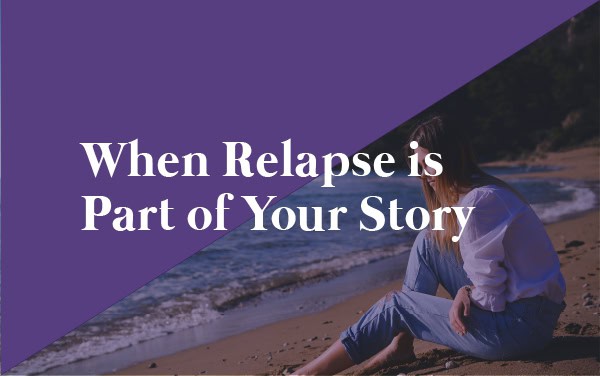
by Kerri MacFarlane | Aug 15, 2021 | Alcohol Relapse, Blog, Early Sobriety, The first Year
I saw the following quote about relapse on Instagram the other day. When I first read it I thought, ‘gross!’, and scrolled on. Throughout the day the quote kept coming back to me though…perhaps because I have 3 dogs that are often doing gross things. But the more I thought about it, the more I agreed with it.
“It is the return of a dog to his vomit.”
― Paul Verlaine
Relapse IS kinda like the return of a dog to his vomit. ?? But it is more than that, much more.
In its simplest terms, a relapse is when you start drinking again after a period of abstinence.
I think relapse is one of the scariest words for people in recovery. But it is also a very normal part of the recovery process…and it does not mean you have failed. If you have listened to the Recovery Elevator podcast or are part of our Café RE community you have probably heard the term ‘field research’. Many of us use that term in place of the word ‘relapse’. Some people, such as Paul Churchill, feel that the word ‘relapse’ is another word in recovery, similar to the word ‘alcoholic’, that needs to be thrown out. Paul talks more about that here.
Alcohol is one of the most commonly ingested substances in the world. The 2019 National Survey on Drug Use and Health found roughly 16 million Americans were heavy alcohol users, and 14.5 million Americans had an alcohol use disorder. Stress, anxiety and isolation caused by the Covid-19 pandemic have worsened these numbers.
Over 30% of people who attempt to stop drinking relapse in their first year of sobriety, but that rate does go down over time. After 5 years that number has dropped to 9.6%. I left out a lot of the statistics, but the bottom line is more than 70% of people struggling with alcohol abuse will relapse at some point.
That doesn’t mean they won’t get back on that wagon and succeed.
I’ve heard people say that the relapse starts way before you actually pick the drink back up, the relapse itself does not occur all at once. I don’t think that anyone plans for, or intends for a relapse to occur. But they do happen, and they happen in stages.
“Stressing about a relapse happening only leads to a release happening.”
― D.C. Hyden
THE STAGES OF RELAPSE
Experts say that relapse occurs in three separate stages — emotional, mental and physical.
- Emotional relapse: The person is not actively drinking or even thinking about drinking, but they are having thought patterns that could possibly be setting them up for a future relapse. This is also where triggers come into play. A trigger could be going to a location where you used to drink, hanging around people you used to drink with, or participating in an activity that you used to drink during.
- Mental relapse: The individual in a mental relapse is waging an internal battle. One part of them wants to remain sober, and the other part wants to drink. Once you have given yourself mental permission to pick up the drink, even for “just this one time”, it can be very difficult to hold on to your sobriety.
- Physical relapse: The individual starts to actively drink alcohol again, often resulting in, and leading up to, previous patterns of alcohol abuse.
A relapse will have you feeling guilty, ashamed and tempted to throw in the towel. But don’t! Use those feelings to get back in the saddle.
That’s what I have done (am currently doing in fact). Will relapse be a part of your story? Maybe. Maybe not. It is, however, a part of mine.
I have had a recent relapse…and it’s not my first. (God willing it will be my last! ??). I have those feelings of guilt, shame, that I’ve failed…myself and everyone else, that I’m not good enough for the people that I surround myself with. But I’m using those feelings…using them to help me do better, be better.
I can’t tell you when my relapse started…because again, it started long before I picked up the bottle. And I also can’t tell you how long it would have continued had I not been called out on my bullshit. What I can tell you is I stopped using the tools in my recovery toolbox. I can tell you I never reached out for support or asked for help…and my support circle is LARGE (something I learned after sharing I had relapsed). I won’t make those mistakes again.
I can also tell you that it feels really good to be sharing with that support circle now. ??
Today I feel good.
IWNDWYT (I will not drink with you today.)
Until next time, be well.
Kerri Mac ??
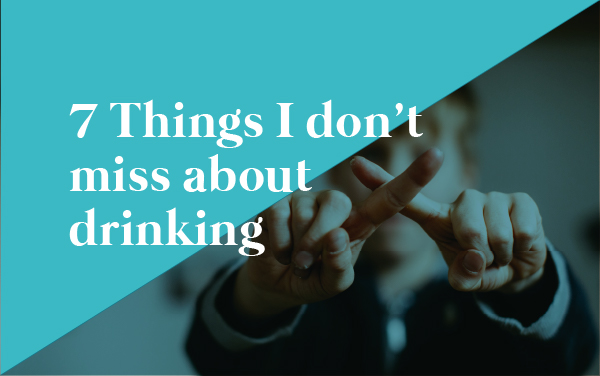
by Kerri MacFarlane | Jun 15, 2021 | Alcohol Relapse, Blog, Early Sobriety, Helpful Tips, The first Year, Uncategorized
There was a time that I was afraid to stop drinking. I was afraid that I would fail. I was scared about removing something from my life that had been a part of my life for over 30 years.
I thought drinking made me fun…so by quitting I would be boring. I would lose friends. Which in hindsight was crazy thinking since I drank at home, alone, for the last 15 or so years. I didn’t have friends…drinking friends or not. Sounds like the opposite of fun to me now.
In the beginning the thought that I would have to be ‘in recovery’ for the rest of my life was depressing and overwhelming. Was I always going to have to work so hard? Was whether or not I was drinking going to be my only real story? I now see recovery as a gift.
I am truly grateful for my recovery and being in recovery. I can now take a step back and list off things that without my recovery I wouldn’t have. Things I’ve gained. Things I’ve regained.
I can also step back and remind myself of the things I don’t miss about drinking. Here’s a few of them.
1️⃣ The hangovers. The bloody hangovers. This is probably the main thing we can all relate to and the first thing that comes to mind when someone asks you what you don’t miss about drinking. Peeling your eyelids open, the pounding headache, nausea, vomiting, dehydration, shakes, lack of energy. There was a time that was my everyday routine. I would either sleep the day away, finally starting to feel human again later in the afternoon…when I would start drinking again. Or I would have a couple shots early in the morning to help get me through the day. My motivation and productivity was at zero. I don’t miss the hangovers.

2️⃣ The blackouts. Waking up and checking my phone in fear…when I could find my phone. Who did I talk to? What did I say and do? Not having a conversation the next day because I very well already had the conversation the night before and don’t remember. Playing detective the next day. I was a blackout drinker from day 1. I don’t miss blacking out.
3️⃣ The anxiety, the shame and regret. 3:00 am was the worst. I would get up and drink…if I could find the bottle I hid…just so I could fall back asleep. I never really thought I had anxiety until I stopped drinking and it went away. I don’t miss not sleeping properly, I have never experienced sleep like I have since I quit drinking alcohol, it really is incredible. I don’t miss the anxiety, the shame and regret.
4️⃣ Apologizing…over and over…again and again. It’s true that action speaks louder than words. But I truly was sorry that I drank, again. I truly was sorry that I said I wouldn’t, but I did. I don’t miss sounding like a broken record with the apologies.

5️⃣ Always thinking about alcohol. I don’t miss thinking about alcohol all the time. Have I got enough? Should I go and get some more? What if it runs out? Is it too early in the morning to go buy more? The mental energy spent when drinking is exhausting. I don’t miss always thinking about alcohol.
6️⃣ The harm to my health and physical appearance. My skin looked like shat. I had bags under my eyes. I looked years older. I ate junk food in excess. I had high blood pressure. I couldn’t sleep. I had no energy. When you’re actively drinking you don’t necessarily realize the toll it’s taking on your body, or you just don’t care. But when you remove alcohol, it becomes pretty obvious how it was affecting you physically. I don’t miss harming my health and good looks. ?
7️⃣ Disappointing the people I love, disappointing myself. Not to say that after ditching the booze I never disappointed the people I love or myself again. Because that is just not true. I am human after all. But I can say I stopped the groundhog days of doing it. And once I was able to let go of the shame I was able to believe that I am not a failure because of my failures. And I was able to start rebuilding relationships…the most important one being the one with myself. I don’t miss repeatedly letting those I love down.
There’s more I could add…but I’ll stop there. I feel the longer I am in recovery the longer my list will get. Some days it is easy. Other days I have to use more of my tools. It’s not saying no to alcohol, it’s saying yes to a better life. And there are wonderful things on the other side…you just have to trust yourself you CAN get there.
But it really is worth it.
Until next time, be well.
Kerri Mac ??
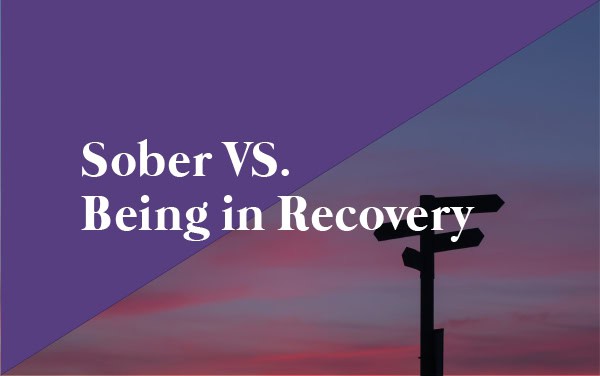
by Kerri MacFarlane | Apr 18, 2021 | Alcohol Relapse, Blog, Early Sobriety, Expectations, The first Year, Uncategorized
“I’m sober.”
“I’m in recovery.”
Two statements that very often get interchanged. If you think they mean the same thing, think again. There is a distinct difference. Being sober is very different from being in recovery. You can be one or the other…or you can be both.
Choose both.
What Is Sobriety?
When you have eliminated alcohol from your life you are deemed “sober,” and although sobriety is part of recovery, sobriety alone is often a temporary and fragile state. Think of the terms “white knuckling it” and “dry drunk”.
White knuckling your sobriety means you are trying to manage your addiction without help. You are using your will power or trying to fix yourself with your mind.
A “dry drunk” is someone who is sober but is struggling with the emotional and psychological issues that led them to have a problem with alcohol in the first place.
Just because you no longer live under the influence of alcohol it doesn’t mean that other unhealthy aspects of your life have changed. For example, you may still have poor or damaged relationships, behavioral health issues, mental health issues, or emotional issues that need to be addressed.
Sobriety is considered to be the natural state of a human being at birth. A person in a state of sobriety is considered sober.
What Is Recovery?
There is no “standard” definition of “recovery” in the addiction community, and part of the reason why is because everyone’s recovery journey is unique. ??
According to SAMHSA, recovery is “a process of change through which people improve their health and wellness, live self-directed lives, and strive to reach their full potential.”
A person in recovery is continually making an effort to work through the issues that caused the alcohol abuse to occur in the first place.
In recovery is a powerful period because beyond everything else, it signifies that you know you have a problem and you are trying to fix it. Recovery allows you to make positive changes and deeply examine your feelings, beliefs and behaviors. Recovery does not mean you fix your issues right away. It means you recognize something is wrong, which is the first step and a critical part of getting help.
People in recovery have the greatest chance of maintaining long-term sobriety. Better yet, they have the opportunity to live a happy and productive life that is free from addiction.
I love this list that Odette shared on the podcast, episode 316…titled the same as this blog…”Sober” VS “In Recovery”.
When you are in Recovery, you:
- Feel a kinship to those who are also in Recovery. (SO true!)
- Make decisions based on how it could impact your Recovery. (“My recovery must come first so that everything I love in life does not have to come last.”)
- Adjust friendships and relationships based on how they could affect Recovery. (BOUNDARIES!!)
- Never let down your guard. (I don’t got this!)
So, can you be sober and not be in recovery? Absolutely! And although you can achieve a state of sobriety with simply abstaining from alcohol, with time, you will come to find that the life you want comes not just from being sober but from entering into the recovery mindset. ?
And you know what the cool thing is? You don’t have to be an alcoholic to live in this mindset. ? The mindset that allows you to grow and develop your self awareness, the mindset that allows you to see beyond the surface and question many things in life like relationships and boundaries. That mindset is for everyone.
Once I got past the early days of sobriety I started thinking of my sobriety journey as my recovery journey. I realized that it was about SO much more than just ditching the booze. That the recovery process is one of ongoing healing and that there is no part of my life that my recovery doesn’t touch.
I also learned that it is rarely accomplished alone. I wanted to be around others ‘in recovery’. Not just because they were sober and could relate to that part of my life. But because they want to grow, want to learn, want to be better.
Transitioning from sobriety to recovery takes both commitment and action.
If you are a grey area drinker or someone who doesn’t even know if they belong here because you are not alcoholic enough…I hope you know that recovery is for EVERYBODY.
E V E R Y B O D Y.
You have your seat at this table, no matter what.
Until next time, be well.
Kerri Mac ??
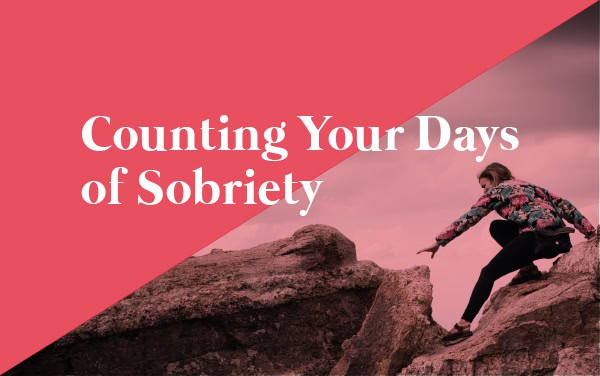
by Kerri MacFarlane | Feb 15, 2021 | Blog, Early Sobriety, Expectations, Helpful Tips, The First 24, The first Year
Do you keep count of your days of sobriety? Do you keep track of how many days you have away from alcohol? ? Should you? People fall into one of two different camps when it comes to that question.
One camp says yes…keeping track and counting your days of sobriety helps you. In the early months it can be a powerful motivator. That running count can give you the confidence you need to get through the hard days. It can be a way of measuring your progress, to help you visualize the distance you are putting between yourself and your drinking past.
The other camp says no…day counting can backfire, be counterproductive, and hurt you. It adds a layer of unneeded pressure. And really the only day that matters is TODAY…so why would you keep track? Quality of days over quantity of days is what’s important.
And what is more important…emotional sobriety or continuous sobriety? If you are white knuckling it through every day…counting those days you are staying away from the booze but miserable…is that enough?
Like anything else in the recovery world I don’t think that there is a right or wrong answer.
Just like there is no right or wrong way to get sober. Counting days is neither right or wrong. It’s entirely up to the individual. It’s entirely up to YOU. And you may feel one way about it and then change your mind along the way. And that is OK.
“The importance of sober time is a contentious issue, considered by some to be “just a number” and others, the barcode stamped on your very soul. Fact: your sober date is yours, and this means you can report it however you wish, if at all.” ~ Anna James
Day counting is a big deal in some 12 step programs, such as AA. There are chips for 24 hours, 1 month, 2 months, 3 months, 6 months, 9 months, 1 year…you get the picture. There are terms thrown around like “new comer” and “old timer”…all depending on how much sobriety time you have. There are celebrations and cake! (I like cake! ?) Certain service positions will become available to you after reaching a specific amount of sober time. Chips, cake, service position opportunities…that all sounds fab! Right?!
But…let’s say you have 10 years of continuous sobriety…and for whatever reason you go out and do some field research (aka…drink alcohol)…well my friend, then you are back on day 1. Doesn’t matter if it was one drink or a night of drinks. You just ‘lost all your time’.
Ouch. Back on day 1. But what happened to those 3,650 days you just had? Are they just gone? As my friend Kate would say…gone, like a fart in the wind? ??
The ‘pro-keeping count camp’ believes that, because you will have to reset your counter and will be back on day 1, that counting sobriety days will stop you from doing that field research. That you will think twice about picking up that drink. Doesn’t always work that way though.
Personally I feel like counting days can be a slippery slope. (Don’t come at me ?…that’s just my opinion…and I am just one little person in this great big world full of people in recovery!) I mean c’mon…we are all human…and alcohol is a sneaky piece of shit. What if…in spite of the fact that you have 3,650 continuous days of sobriety…you pick up again? You’ve been stacking those days and now find yourself back on day 1. Time to reset your tracker my friend. But wait! Since you are starting over again why not drink through the weekend…and then restart your tracker. Or, continue through the upcoming holiday and then restart it. Before you realize it, weeks have gone by and you have continued to drink. ?
I’m not entirely against counting your days of sobriety. In fact quite the opposite. It was a tool I used and a HUGE part of my early sobriety. HUGE! Those first 100 days I was checking my tracker daily. I always knew what day I was on even without checking my tracker app. Counting those days in my early sobriety was a big motivation for me. Made me feel successful. So if you are just starting out, counting the days can be an indispensable tool. And there are a lot of apps out there that will help you keep track.
After I hit 100 days things started to change. Counting the days became less motivating for me. I started finding my motivation in other things…like how I was experiencing less anxiety, I had more energy, my mood was better, I was becoming more active. After I hit those triple digits I found I didn’t (and don’t) need the daily reminder of how far I’ve come.
I also stopped keeping track of the days because it just started to feel so overwhelming. With my desire to never drink alcohol again I was proud of the number of days I had gone without drinking…but then overwhelmed by the number of days I still had before me. ? I know…I know…one day at a time. But counting days was causing me to continuously think about the enormity of my decision to ditch the booze for good. That is not healthy or helpful.
Counting your sobriety days…or your days away from alcohol…is a very personal choice. And the way you do it, if you decide to do it, is also entirely your choice. If you’re counting because you feel it is expected of you…then don’t. ?? If you are motivated by waking up in the morning and seeing the number on your tracker go up…then do. ??
Even though I don’t count my days anymore I am forever grateful for this simple strategy that helped me during my early days of sobriety. The most important thing I hope you will remember is that no matter what your day count is…it is YOU that counts!
Until next month, be well,
Kerri Mac ??
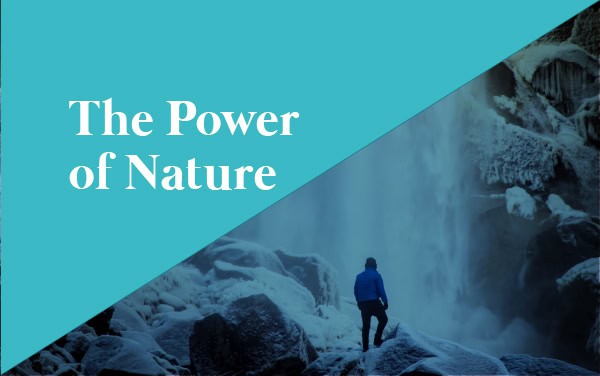
by Kerri MacFarlane | Jan 20, 2021 | Blog, Early Sobriety, Helpful Tips, Nature, Uncategorized
Nature.
I can get lost in it. It’s where I can recharge my soul. And it’s one of my most used tools in my recovery toolbox. I feel better when I spend time outdoors. And when you feel better you are less likely to ‘relapse’. BONUS!
One of the great things about nature is that it is EVERYWHERE. I think that’s important to remember…especially during times such as these…with so much quarantining and isolating. IT’S EVERYWHERE. We are spending so much time indoors and online, when nature can help our brains, our bodies and our recovery.
Just a few of the favorable rewards we can get from nature are:
- Being in nature reduces stress and anxiety!! Hell yes! Better than anything you can find in pill form! And free! Calming nature sounds (even outdoor silence) can lower blood pressure and levels of the stress hormone cortisol, which calms the body’s fight-or-flight response.
- Find yourself feeling a little crabby and cantankerous? Get back to nature! Research in a growing scientific field called ecotherapy is showing a strong connection between the time we spend outdoors and our moods.
- You will see an increase in your focus, concentration and creativity…which in early sobriety, as your body adjusts to a life without alcohol, is common to see the opposite.
- You’ll see an improvement in your short term memory.
- Less loneliness and boredom….which can often be ‘relapse’ triggers.
One of my favorite things to do outdoors is Geocaching! Have you heard of it? It’s like a treasure hunt. ?? And it’s worldwide. I try and do it on all my travels. One of the things I like most about it, other than I just find it a lot of fun, is that it helps me get out of my head and my thoughts. I’m just out in nature looking for that next smiley face. ? (If you’re a cacher too, you know what I mean.?)
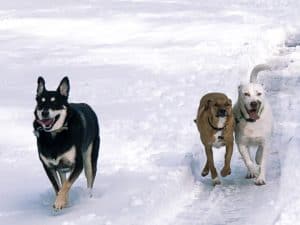
I also LOVE to hike.
My husband and I have 3 large rescue dogs…
Acelyn, Bobo and Noggin.
I call them my pound puppies.
When the weather allows it we
take them and go hiking every
Sunday we can.
There are tons of outdoor activities that will help you add a little more nature to your life. Some suggestions…
- Go for a walk, a bike ride
- Create a backyard garden.
- Find a quiet grassy hill, or bubbling brook, and meditate.
- Look up the local parks in your area…and visit them!
- Take a nap in the park.
- Skip rocks.
- Look under rocks.
- Go birdwatching! Another fav of mine that I’ll do for hours in the morning from my very own backyard. I live on a greenbelt and have a creek in my backyard…so LOTS of birds!
- Take up outdoor photography. (This is on my list!)
- Rock Climbing
- Fishing
- Solo backpacking or camping. (Also on my list!)
- Go look for wildflowers.
- Sit and listen to the wind in the trees.
- Find the end of a rainbow.
- Hug a tree! (Like my daughter and granddaughter are doing in this picture! ??)

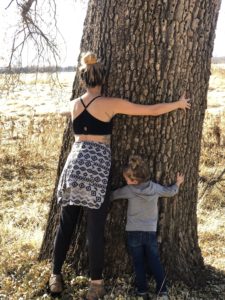
If you can't make it outside then try listening to nature sounds, not exactly
the same but it can have a similar effect.
I love this quote, by Eckhart Tolle, from Stillness Speaks.
“When walking or resting in nature, honor that realm by being there fully. Be still. Look. Listen. See how every animal and every plant is completely itself. Unlike humans, they have not split themselves in two. They do not live through mental images of themselves, so they do not need to be concerned with trying to protect and enhance those images. The deer is itself. The daffodil is itself.
All things in nature are not only one with themselves but also one with totality. They haven’t removed themselves from the fabric of the whole by claiming a separate existence: “me” and the rest of the universe.
The contemplation of nature can free you of that “me,” the great troublemaker.”
That last line nails it…”The contemplation of nature can free you of that “me,” the great troublemaker.”
“Free you of that “me.”
On top of all the benefits I listed above getting out and being one with nature can help you get out of your own head. To just be yourself.
Do as the deer and the daffodil, do.
I’d love to learn how you spend your time in nature. ?
Until next time, be well.
Kerri Mac ??












